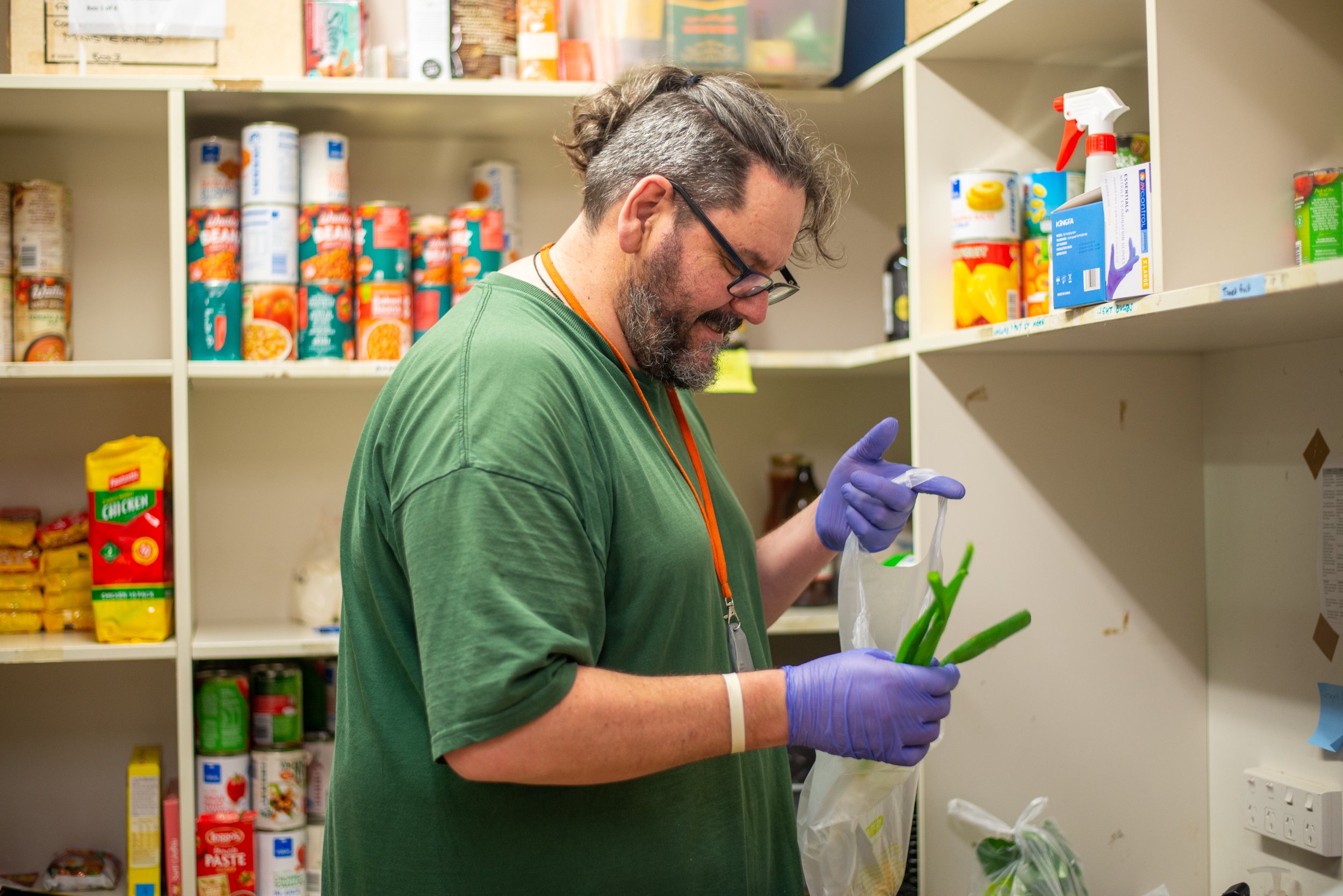Healing through kindness – Jason’s story
It’s a cold mid-winter’s Monday morning at DCM, and the building is bustling with activity. Jason has just arrived for work, and there’s plenty to be done.
Jason is going to show a new volunteer the ropes. Food awaits pick-up at some local churches, Kaibosh and New World – and when the DCM van returns Jason will have food parcels to pack so whānau can receive emergency food assistance.
For Jason, employed as kaiāwhina in DCM’s Foodbank, he knows that there are lots of little ways he can help. For example, “If someone needs an overnight food parcel, chances are they’re rough sleeping. So I’ll go out of my way to make sure they have some disposable containers, tear tabs – I couldn’t think of anything worse than being given some food and not being able to eat it!”
Another day in DCM's busy Foodbank.
Jason describes it as a selfless job. “It really gets me out of my own way, to help share the vision of DCM. I always walk away at the end of my shift feeling better about myself.”
Looking back into the past, and toward the future, Jason remembers kindness. But life was not always kind to Jason, and he is remarkably honest about his journey.
Jason was born in the Hawke’s Bay, where family life was pretty tough. “I had an alcoholic stepfather who brought violence into the home,” Jason shares. “My mum was trying to raise me and my two brothers and she kind of got trapped in this relationship and couldn’t escape.”
Jason came out when he was quite young, and he was bullied at school. This had a big impact on him, as did working in hospitality from a young age. Jason is reflective about how drugs and alcohol helped him to suppress his emotions.
“So you have the cultural aspects, and the family harm aspects, and also depression runs right through my family. I didn’t have good coping mechanisms. So one thing I learned is that when things get tough you just pack up and run.
“I learned to pack very lightly, and not put roots down. I couch surfed, spending many years doing that. I learned that all your possessions are the clothes on your back, and what you can carry.”
Jason was thrown out of places for not paying rent due to his drug problem, ending up in Australia. But despite the change of scene, and a good job in hospitality, Jason acknowledges, “I thought life would be OK. But I still hadn’t addressed that I had a drug and alcohol problem. Or that I was an addict.”
It was back in New Zealand that Jason reached what he describes as his lowest point. “I remember getting to a point where I’d use drugs, walk around the house, and felt like I just ‘existed’. That was a scary feeling. I just felt empty, like I had nothing.”
With family help, Jason was finally able to start the process of getting into rehab. That took four months, and in the meantime Jason started going to 12-step meetings, and anything he could find that was recovery-focussed. “I found online blogs of people sharing stories about how they managed to give up drugs, and I was drawn to that kōrero,” Jason says. “I thought, ‘Hang on, there’s a life outside this?’”
After a relapse, Jason found himself rough sleeping. He went to Work and Income to ask for help with emergency housing, and they suggested popping down to DCM to get some food, where Dominic was his first point of contact.
“I was a mess, but Dom was really kind. He helped me with a food parcel and then we had a bit of a kōrero about how DCM could help. I was willing to take whatever help I could get, and he said that Evan had just started at DCM, and that he would like to engage me with him. I wasn’t too keen on meeting a drug and alcohol counsellor! I just wanted to isolate in my own little bubble, and wallow in my pity. But as I was walking out of the interview room, Dom goes, ‘Oh, this is Evan here!’ So I didn’t have a choice in the matter! And that was kind of a turning point in my life.”
Jason with DCM drug and alcohol counsellor Evan.
From then, Jason started popping down to DCM regularly. “I would come down most mornings, even if it was only for a coffee and a chat to the staff. Just so that they had ‘eyes’ on me. I started opening my doors for change. I just let DCM in.
“I maintained going to regular meetings – every single day, even when I didn’t want to. I joined Te Awatea. I would go along Mondays and Fridays. And have a kōrero in there with the other taumai, sharing my journey, and what was going on for me. It is so good that there is a safe space at DCM for people to speak openly and honestly.
“Evan used to call me, saying ‘Hey brother, I’ve put your name down for this. If you’re not interested, you don’t have to do it’. As I started getting better I decided to take up the challenge of doing the things that scared me the most. And one of those things was doing the peer support training with Brodie and Hannah at DCM.”
Jason was able to access other services at DCM, such as the emergency dental service. “I was terrified of seeing the dentist!” Jason explains. “I hadn’t looked after myself, but the dentist (Morris Wong) was amazing. He sees people. He talked me through my anxiety. It wasn’t as bad as I expected. I needed a tooth extraction and a filling, probably two things people fear the most. And he helped me through it. I went away thinking, ‘Wow, what a great experience!’”
Jason also saw the Te Aro Health nurses at DCM. “Don’t even get me started on them! Rebecca and Bronwyn have been incredible, and super-supportive. I went to Bronwyn with a medical problem and she made it her business to push for the hospital to see me. They helped me, and it’s been great. She went above and beyond, just pushing for them to do something.
“All the staff at DCM are amazing,” Jason adds. “All the staff who are there now, and those who have moved on.”
Having completed training with PeerZone, another kaiāwhina (Renee) suggested Jason apply for a job working in the DCM Foodbank.
“She set up an interview and I was absolutely terrified about going into a job. I hadn’t been in employment for eight years. I didn’t know if I’d be any good or be able to hold the job down. So much unknown, but I used a bit of courage. Then I thought, actually, the job’s not about me. I found purpose in the job and that’s about knowing that the mahi that I’m doing is impacting the lives of others today.
“I used to give money to street beggars – until Evan pointed out the dangers. If I’m walking down the street now and hear a taumai calling out to ask for money I say, ‘If you’re hungry, pop down to DCM. WE can help.’”
Jason now has a whare with help from Evan and DCM's Aro Mai Housing First team. He is proud to be housed, working, and officially off Work and Income’s books. He’s even ditched cigarettes. But most of all, Jason is proud to be living clean, one day at a time.
“What I have learned in that time is to show others compassion and kindness. And that comes from the people who have loved me since walking through the doors at DCM. I wasn’t judged and they were there to help me. So today I try to see people and meet them where they’re at. I’m continuing to show that love and kindness to others.”
Jason now has a life he never dreamed he’d have. “Some days I still feel like an alien trapped in my own body. I definitely don’t have it all together – but that’s OK. I’m on the right path. I’ve had many months of re-building my Te Whare Tapa Whā. I’ve learned core values and spiritual principles along the way. I’m a better person today, and I’m OK with who I am.
“When I look back to my darkest times, what stands out to me the most are those who showed me kindness. Those who were able to be there for me, to say ‘It’s OK. It won’t be like this forever.’
“So I remember kindness – that’s the biggest thing on my list today.”
Photos by Gabrielle McKone.





